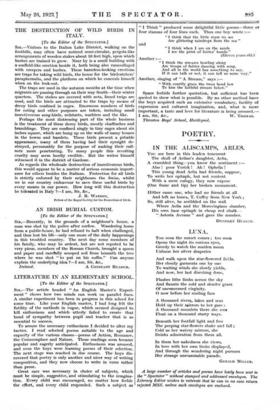LITERATURE IN AN ELEMENTARY SCHOOL.
[To the Editor of the SPECTATOR.] Sin,—The article headed " An English Master's Experi- ment " shows how two minds can work on parallel lines. A similar experiment has been in progress in this school for some time. Like your English master, I had long felt the futility of the methods in vogue, which seemed designed to kill enthusiasm and which utterly failed to create that bond of sympathy between pupil and teacher that is so essential to success.
To arouse the necessary enthusiasm I decided to alter my tactics. I read selected poems suitable to the age and capacity of the various classes—poems of Action, Romance, the Commonplace and Nature. These readings soon became popular and eagerly anticipated. Enthusiasm was aroused, and soon the boys were learning poems of their selection. The next stage was reached in due course. The boys dis- covered that poetry is only another and nicer way of writing composition, and they now choose to write in verse rather than prose.
Great care was necessary in choice of subjects, which must be simple, suggestive, and stimulating to the imagina- tion. Every child was encouraged, no matter how feeble the effort, and every child responded. Such a subject as " I Think " produced some delightful little poems—three or four stanzas of four lines each. Thus one boy wrote :- " I think that the little stars we see and Are glittering raindrops from the sea " " I think when I am on the sands Another :- I see the print of fairies' hands." (Eleven years old.) " I think the streams bowling along
Are troops of fairies dancing with song. And all in the world has something to say.
If it can talk or not, it can tell us some way."
Another, singing of " A Stream," says With courtly grace the trees bend low To kiss the faithful stream below."
Space forbids further quotation, but sufficient has been quoted to show what is possible. By no other method have
the boys acquired such an extensive vocabulary, facility of expression and cultured imagination, and, what is more important, a taste and love for literature is being aroused.—










































 Previous page
Previous page